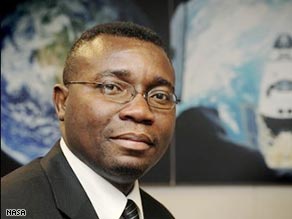Ave Kludze, Jr., NASA headquarter’s engineering program manager led a Rocket Study, motivated and conducted to provide fundamental knowledge and extensive review of the way they NASA will shape future space missions.
ROCKET PROPULSION STUDY HELPS CHART NASA'S FUTURE
Throughout the last several decades, Princeton engineers have played various key roles in the advancement of space travel and its related technologies for the National Aeronautics and Space Administration (NASA), and for the last year Princeton engineer Yiguang Ju was integral in just such a contribution.
Ju, a professor of mechanical and aerospace engineering, participated in NASA’s recently completed Rocket Study, a yearlong collaborative analysis of the pros and cons of solid- and liquid-fueled rockets – a critical review as the administration approaches a unique crossroads. According to Ju, the recent retirement of NASA’s shuttle program—which used a very efficient liquid-hydrogen-fueled rocket (the space shuttle main engine) and two solid rocket boosters—means that the U.S. is becoming incapable of sending astronauts using large, liquid-fueled rockets into low-Earth orbit (LEO) or to the International Space Station.
While solid rockets are more robust and require lower manufacturing and maintenance costs, they also have low thrust efficiency, said Ju. Historically, NASA shuttles had the most sophisticated reusable, two-stage combustion, liquid hydrogen and oxygen-fueled rocket engines, but they required intensive maintenance after each flight. With the retirement of the shuttle program, the most advanced and only available large-thrust, liquid-fueled space shuttle main engine made in the United States will be retired as well.
"The question then becomes, ‘What should NASA do and how should it focus its future efforts?’” said Ju. “Does NASA need to rebuild a large hydrocarbon liquid rocket like the current Russian RD180 series, or a large solid rocket similar to the space shuttles’ solid rocket boosters?"
That question was the primary focus of the administration’s study, but the implications of the answer go beyond the mere differences between two different technologies. For instance, Ju says NASA needs to consider whether it will continue to focus on LEO missions or pay more attention to deep space activities beyond the Earth and Moon, essentially leaving the LEO business to private companies.
The Rocket Study, which ran from August 2010 through August 2011, was motivated and conducted to provide fundamental knowledge and extensive review of those implications and the way they will shape future space missions. NASA is currently working on compiling the findings of the study, which should be published within the coming year. Ju’s contribution to the discussion was essential to the process.
“Professor Ju is a world-renowned expert in this field, and his participation in the team was extremely valuable,” said Ave Kludze, Jr., NASA headquarter’s engineering program manager in charge of the study. In September, Kludze visited Princeton and presented Ju with the NASA Administrator’s Certificate of Appreciation for his role in the investigation.

“This was one of the best and most challenging projects I have ever managed,” said Kludze. “I was very glad to have someone of his caliber on my team.”
Last June, Kludze began assembling that team, which eventually totaled 60 individuals representing NASA, private industry, and academia, with various levels of expertise in solid rocket propulsion, liquid rocket propulsion, rocket industry infrastructure and industrial base, cost analysis, safety and reliability, environmental factors and international rocket propulsion trends.
The idea was to objectively “examine and re-examine the underlying biases and assumptions that have led to basic—and sometimes incorrect—perceptions, understandings and concepts of liquid and solid rocket propulsion systems,” said Kludze.
“This was a show-me study based on facts,” he added. “If you couldn’t prove it, it wasn’t going in.”
On its surface, the discussion could seem simple. Hydrocarbon-fueled liquid rockets are non-toxic and have the capability to more accurately control a rocket’s thrust and have a better specific impulse (propulsion efficiency) -- that is, how long one pound of propellant can deliver one pound of thrust.
However, these rockets also require a complicated turbo-pumping system to feed the fuel into the high-pressure rocket combustor. Comparatively, a solid rocket delivers a lot of thrust for its volume and can reduce air drag for low sea-level propulsion. It is also, said Ju, much simpler to design and maintain.
Which technology better serves NASA’s future purposes is the stuff of complex debate.
“We wanted all kinds of different viewpoints, because we all come out of engineering school with opinions and biases informed by our professors and peers, and sometimes we tend to believe certain things without question,” said Kludze. “This study forced us to go back and look more carefully at some of those biases from many perspectives.”
Ju’s perspective came not only from his celebrated body of work in the science of rocket propellants and technologies, but also from his multinational background, which includes an undergraduate education in his native China and a Ph.D. from Japan’s Tohoku University in 1994.
“I’ve never met anyone with that unique set of background qualities from China, Japan, and the United States,” said Kludze. “He has a good understanding of what goes on in other parts of the world, and he brought that experience to the team, broadened our perspectives, and helped us to look at things from a different angle.”
Ju, who has been on the Princeton faculty since 2000, develops new technologies and investigates basic principles in sustainable energy, propulsion, and functional nano-materials. He said that his involvement in the NASA study caused him to harken back to something a graduate advisor at Tohoku University of Japan once told him.
“He said, ‘Aerospace is not just about technology. It is about a dream to educate the next generation,’” said Ju. “So when I got the call from Ave last summer, I knew this was a big deal and that I very much wanted to be involved.”
Diaspora News of Tuesday, 1 November 2011
Source: http://www.princeton.edu
Ghanaian Leads NASA's Rocket Propulsion Study

















